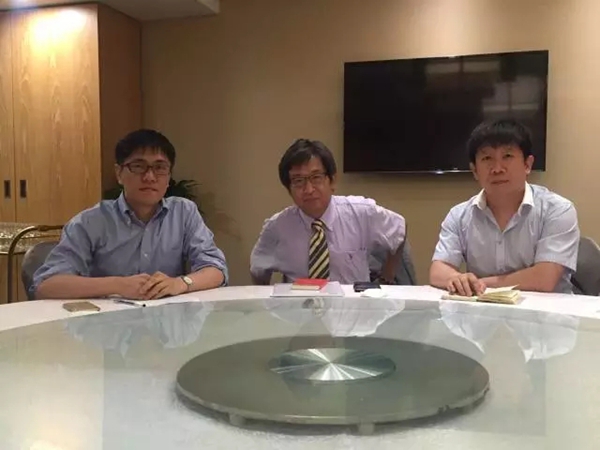Experts: China, Japan, S.Korea should cooperate despite differences
- By Zhang Rui
 0 Comment(s)
0 Comment(s) Print
Print E-mail China.org.cn, August 29, 2016
E-mail China.org.cn, August 29, 2016
|
|
|
From left to right: Zhao Gang, a researcher from the Institute of Japanese Studies in the Chinese Academy of Social Sciences; Kim Sangsoon, president of the East Asia Institute and a researcher at the Charhar Institute and Wang Chong, vice president and senior researcher of the institute |
Experts at a Chinese think tank round table discussion in Beijing last Friday suggested that the leaders of China, Japan and South Korea should meet at next week's G20 summit in Hangzhou to promote a win-win future.
The meeting, held by the Charhar Institute, invited Wang Chong, vice president and senior researcher of the institute, Kim Sangsoon, president of the East Asia Institute and a researcher at the Charhar Institute and Zhao Gang, a researcher from the Institute of Japanese Studies in the Chinese Academy of Social Sciences to share their opinions prior to the summit.
"Not only the leaders of the 20 member countries will attend the Hangzhou summit, but also present will be leaders from eight countries as invited guests, as well as representatives of the World Bank, WTO and IMF. The most powerful figures in the world will gather so the G20 summit is very important," said Wang Chong.
"Among those present, President of South Korea Park Geun-hye and Japanese Prime Minister Shinzo Abe will be very important guests," Wang added.
Due to the issue of American deployment of the nuclear missile system known as THAAD (Terminal High Altitude Area Defense), the relationship between China and South Korea has become a very sensitive one. Yet, Wang stressed, the bilateral relationship had not fallen apart.
"The two leaders should talk face to face and lower the danger level and reduce the damage to the minimum." He believed China should have close relationship with South Korea to ensure balance in trade and regional security, as well as for dealing with North Korea.
Wang also believed Chinese President Xi Jinping would meet Japanese Premier Abe at the summit. "No matter if it is about crisis control in East China Sea or the free trade zone issue among China, Japan and South Korea, these issues all require a face-to-face meeting."
He added that, even though economic cooperation may not bring about political mutual trust and security in the short term, there will be higher risks for three countries if they can't even cooperate on economic aspects.
Kim agreed the focus should be on economic issues. "The THAAD issue brought about differences between China and South Korea; However, they need to calm down and enhance communication," he said, "The THAAD is actually targeting North Korea, but China thinks it was targeting the China-US relationship or South Korea-US-Japan relationship. During the 24 years China and South Korea have enjoyed diplomatic relations, the communications in economy, society and culture between two countries are the excellent and typical cases in world diplomatic history, but they didn't communicate that much in security area."
Kim also believed the THAAD issue is an opportunity rather than a challenge or a crisis, "The talks between the two parties could cover areas that they have never discussed in depth before. Leaders should meet and could seek common points while reserving differences for the interests of both countries."
He thought it necessary for China and South Korea to move on from the crisis and as China would affirm its position in the global economy through the G20 summit, it should pay more attention to bilateral and even the whole world's economic development rather than focus merely on the THAAD issue.
Zhao Gang stressed the most important thing in Sino-Japanese relations is "control."
"There are many things that need control between the two countries," he said, pointing out that China has some suspicions about Japan. "After Abe took over the administration, he wanted to amend the constitution. China didn't know what Japan was thinking. For the victim countries, no matter if it is China or South Korea, it is reasonable for them to have doubts; even some Japanese citizens have doubts, too. So Japan has an obligation to explain to other countries why it wants to change the peace constitution."
Japan also thought China is a military threat and has been improving its military forces and defense budget. "So there is a tense relationship between two countries, and this is escalating. 'Control' is a very important issue," he said, adding that the two countries should continue enhancing civil communications to know each other better.




Go to Forum >>0 Comment(s)